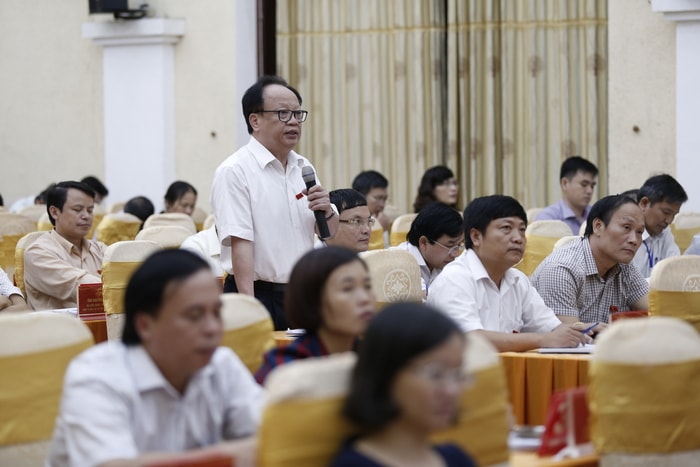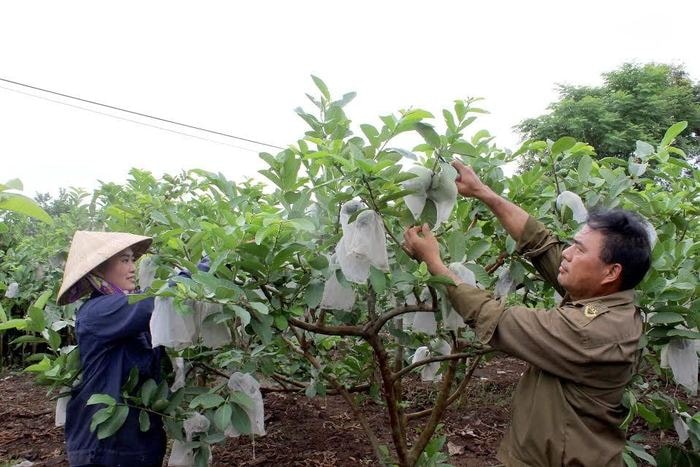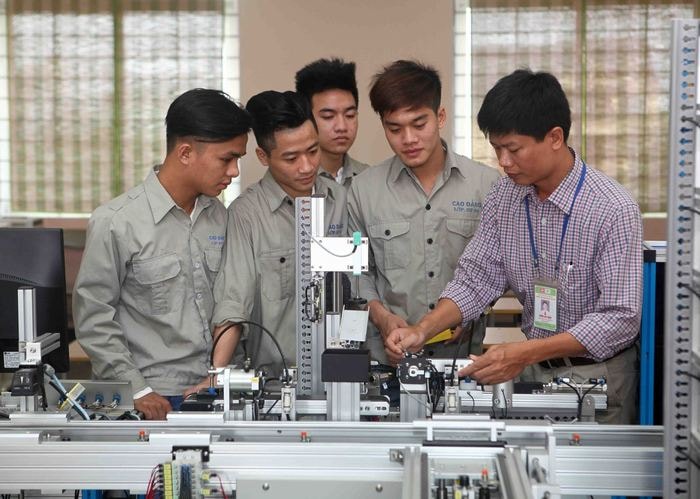Questioning and answering questions: Go straight to the core issue, clearly recognize responsibility
(Baonghean) - The 4th session of the 17th People's Council took place in a lively atmosphere with many frank and responsible opinions from the delegates on "hot" issues in the fields of agriculture, rural areas, vocational training and job creation. This is also one of the contents that attracted the attention of voters and people of the province.
"Hot" output for agricultural products
The first person to answer questions was Director of the Department of Agriculture and Rural Development Hoang Nghia Hieu, and the "hottest" content was the issue of managing production planning, livestock breeding, and output for agricultural products. According to Mr. Hoang Nghia Hieu's explanation, from 2011 to 2016, there were about 5,000 production and livestock models in the whole province.
However, the replication of models into practice has not met the requirements; some successful models have not been replicated, or have not been replicated much, and their sustainability is not high. State management of seeds and pesticides has not been strictly controlled. In particular, the development of production and livestock has not been linked between planning and caring for agricultural output, leading to low competitiveness of products and output stagnation (such as pork, watermelon, banana, pineapple...), causing difficulties for producers. The Department of Agriculture and Rural Development also analyzed the existing problems and proposed solutions, including strengthening management, promoting the connection between production, livestock and product consumption, and enhancing the role of enterprises and cooperatives.
 |
| Delegate Nguyen Van Do speaks during the questioning session at the hall. Photo: Duc Anh |
Questioning the commander of the provincial agricultural sector, delegate Lu Dinh Thi (Que Phong) expressed concern about the low price of passion fruit in the area and questioned the coordination between sectors to develop this crop to eliminate hunger and reduce poverty. Delegates Dang Quang Hong (Nghia Dan), Phan Thi Thanh Thuy (Thai Hoa town), Vo Thi Minh Sinh (Quy Hop) also asked about the responsibility of planning management to limit overlap between crops, output solutions for agricultural products and the responsibility of agricultural officials and civil servants in the fields.
Responding to questions, the Director of the Department of Agriculture and Rural Development acknowledged the shortcomings in agricultural development associated with processing and consumption. To overcome these problems, the Department of Agriculture will continue to advise the province and coordinate with localities and businesses to find solutions to improve product quality and promote agricultural product consumption. Regarding passion fruit products, the Department of Agriculture and Rural Development affirmed that it had held meetings with the Nafoods output-buying factory to increase input prices and strengthen coordination in purchasing for farmers.
Also related to the output of agricultural products, delegate Nguyen Van Do - Director of the Department of Planning and Investment suggested that the agricultural sector should base on Decision No. 80/2002 of the Prime Minister on the policy of encouraging the consumption of agricultural products through economic contracts, especially exclusive seedlings; in production, there must be an agreement between enterprises and people, not "begging" from enterprises when there is an incident. In fact, the failure of pineapple - lemon trees shows that many seedlings have "owners" but "no strength".
Responding to the question about crop planning for Phu Quy land by delegate Dang Quang Hong (Nghia Dan), Mr. Hoang Nghia Hieu said that in the coming time, coffee will be limited because it is not competitive, rubber will not be expanded because of unsuitable weather conditions, and cassava will also stop at the current area. In the coming time, the industry will focus on maintaining the sugarcane raw material area to ensure raw materials for the entire factory to operate. As for orange trees, although currently effective, they are prone to the refrain of "good harvest, low price". Therefore, we will focus on building brands, geographical indications, improving product quality to ensure stable output...
 |
| Commercial guava acreage is growing rapidly in Nghia Dan district. Photo: Xuan Hoang |
Not satisfied with Mr. Hoang Nghia Hieu's answer, many delegates continued to question the Director of the Department of Agriculture and Rural Development about the issue of household economic development, the coordination between the agricultural sector with enterprises and authorities at all levels in solving output for agricultural products... Explaining this issue, Mr. Hoang Nghia Hieu admitted: The problem of consuming agricultural products, whether specialty or popular products, is facing difficulties nationwide.
Mr. Hieu also said that the problem of planning management is also difficult and suggested that districts and communes join hands with the Department of Agriculture to solve this problem. Because many products are at risk of supply-demand imbalance and rapid development such as: Orange acreage is growing strongly; livestock farming is developing beyond scale... The Director of the Department of Agriculture and Rural Development also promised to closely coordinate with departments, branches and localities to promote the construction of links between enterprises and farmers and cooperatives to increase the value of production, livestock farming, processing and consumption of agricultural products.
Evaluating the explanation and response to the questions of the Department of Agriculture and Rural Development, Vice Chairman of the Provincial People's Council Hoang Viet Duong said that the explanation report did not have specific data, but still reflected generally; at the same time, he requested the Department of Agriculture to continue studying the legitimate recommendations of voters and delegates to advise the Provincial People's Committee to effectively manage agricultural development in the direction of goods, associated with processing, and increase income for people. The Provincial People's Council also requested the Provincial People's Committee to review livestock production in accordance with land funds; strengthen planning management; speed up the equitization of agricultural and forestry farms; implement policies to support farmers; review the policy mechanisms of the Central and the province to make appropriate adjustments; call on enterprises to invest in the agricultural sector so that the sector has the driving force to develop in a closed direction with high value...
Labor market forecast deviation
Immediately after the question and answer session of the leaders of the Agriculture sector, Mr. Nguyen Bang Toan - Director of the Department of Labor, War Invalids and Social Affairs took the stage to answer questions related to vocational training and job creation. In particular, the most concerned issue is whether or not there is a situation of "brokers" in labor export and the responsibility of the Department of Labor, War Invalids and Social Affairs for vocational training and job creation has not met expectations.
Opening the question and answer session, delegate Hoang Nghia Hung (Nam Dan) said that in recent times, labor export in the province has achieved certain results, but the management has not been strict, leading to the phenomenon of differences in labor export costs between the same industry and the same country, affecting the psychology of workers. In addition, there is also a situation where businesses "abandon" workers.
Responding to this issue, Mr. Nguyen Bang Toan - Director of the Department of Labor, Invalids and Social Affairs said: Currently, there are about 50 labor export consulting units in the province and each year they send about 12,000 people to work abroad. In the past time, the department has done quite well in management; however, there are still some businesses that do wrong, causing people to lose trust, such as in Thanh Chuong and Que Phong districts recently. Currently, the labor sector has directly worked with businesses and proposed to refund the money to the people; if the money cannot be refunded, it will be transferred to the law enforcement agency for handling.
The Director of the Department of Labor, Invalids and Social Affairs also noted that the management of labor recruitment consulting units for overseas labor export is currently quite strict. However, there are still "fake" units that recruit labor without permission from the authorities. Therefore, localities need to raise vigilance and should not arbitrarily allow recruitment in the area to avoid fraud. Regarding the question of whether or not there is a situation of "brokers", increasing intermediary costs in the process of procedures for exporting labor, Mr. Nguyen Bang Toan replied that he "just heard" and will check and consider.
At the question and answer session, many opinions mentioned the results of training and job creation, with the issue of vocational training for high-skilled workers, vocational training for workers whose land was recovered, and for poor households and ethnic minorities achieving low results.
Delegate Dinh Thi An Phong (Nghi Loc) expressed concern that the number of trained workers is quite high but most of them are short-term trained, so there is a situation where students are not skilled after graduation, and training is not linked to job creation, leading to waste. Delegate Tran Thi Thanh Thuy is concerned about the issue of labor market forecasting and hopes that the industry will have practical solutions to improve this work. Delegate Nguyen Thi Lan (Do Luong) frankly stated that one of the limitations of vocational training is due to "the assignment of targets and implementation of targets not being ensured according to plan".
 |
| Vocational training at the Vietnam - Korea Technical Vocational College. Photo: My Ha |
Responding to this issue, the Director of the Department of Labor, War Invalids and Social Affairs provided many figures. Specifically, in the two years 2015 - 2016, the whole province organized vocational training for 155,196/155,000 people, exceeding the target assigned by the Provincial People's Committee. In addition, jobs were created for 75,360 workers. However, he also admitted that vocational training still has many limitations, the number of workers trained at college and intermediate levels is still low compared to the total number of workers trained annually. The training quality and structure of some occupations of some training institutions have not met the requirements.
Mr. Toan also said that every year the province has a labor market forecast, however, the accuracy is not "close". Regarding this issue, the Director of the Department of Labor - Invalids and Social Affairs also admitted that in the past, the Department of Labor - Invalids and Social Affairs has not "separated" the trained laborers, so there is no specific number for special laborers, laborers who are ethnic minorities, poor households and promised to respond in writing after having a full summary.
Concluding the question and answer session, Mr. Nguyen Xuan Son - Standing Deputy Secretary of the Provincial Party Committee, Chairman of the Provincial People's Council highly appreciated the explanation of the Director of the Department of Labor, Invalids and Social Affairs; at the same time, requested the sector to continue studying the legitimate recommendations of voters and delegates to continue advising the Provincial People's Committee to continue developing the job information system, better connecting vocational training - job creation; soon completing the merger of the Vocational Training Center with the Continuing Education Center.
In addition, actively promote socialization of vocational training and job creation, promote linkages and coordination with enterprises participating in training, especially foreign enterprises, foreign language training for workers to integrate; review the quality of teachers, the list of occupations, supplement and strengthen training facilities and equipment; strictly carry out inspection, examination and testing work, promptly detect and correct errors, and strictly handle violations.
In general, the explanation and response to questions by leaders of the Agriculture and Labor, Invalids and Social Affairs sectors were assessed to have gone straight to the core issues, clearly identified responsibilities and built a roadmap and solutions to overcome them in the coming time.
Reporter group
